Emilie van Haute
@emilievh.bsky.social
2.1K followers
1.1K following
88 posts
Professor of political science @SciencePoULB | Cevipol
Parties, elections, participation
Posts
Media
Videos
Starter Packs
Reposted by Emilie van Haute
Emilie van Haute
@emilievh.bsky.social
· Aug 26
Emilie van Haute
@emilievh.bsky.social
· Aug 26
Emilie van Haute
@emilievh.bsky.social
· Aug 26
Emilie van Haute
@emilievh.bsky.social
· Aug 25

VACANCY – call for applications - Postdoctoral Researcher (100%) in Political Science - CDD – 1 year contract - CEVIPOL - Centre d’Etude de la Vie Politique
https://cevipol.phisoc.ulb.be/fr/vacancy-–-call-for-applications-postdoctoral-researcher-100-in-political-science-cdd-–-1-year-contract
Emilie van Haute
@emilievh.bsky.social
· Aug 25
Reposted by Emilie van Haute
Kai Arzheimer
@kai-arzheimer.com
· Aug 10

When do politicians engage in discourse – and when do they avoid it?
estimated reading time: 4 min When do politicians debate each other? Drawing on a study of debates in the German Bundestag, Elias Koch and Andreas Küpfer show how ideological polarisation shapes who debates whom – and why substantive discourse may become less common in the years ahead. In recent years, concern has grown over the increasing polarisation of democratic politics. Legislatures across Europe and beyond have witnessed rising tensions, sharper rhetoric, and a decline in cross-party engagement. In a new study, we take a closer look at the conditions under which elected representatives engage in discourse and shed light on the implications of rising levels of polarisation among legislators in this context. Several studies have convincingly shown that parliamentary debates are characterised by their dialogical nature and that MPs unilaterally make use of this potential to signal affiliation or contestation vis-à-vis other actors in the chamber. This includes using interjections, applause, parliamentary questions or various forms of address. But under what conditions do actual discursive interactions unfold, rather than these types of parallel performance?We propose a novel analytical framework to make sense of the circumstances facilitating discursive interactions between politicians in parliament. In this framework, we distinguish between inviting MPs, who approach others by inviting them for discursive interaction, and invited MPs,who are being invited for discursive interactions (i.e. who are being approached by inviting MPs). Discursive interactions only unfold when both the inviting MP and the invited speaker are willing to engage. As we show further below, rising diverging ideological preferences and government-opposition dynamics have countervailing implications for invited and inviting MPs in the emergence of discourse in parliament. To explore how heterogeneous ideological preferences and government-opposition dynamics shape the strategic interest to seek and avoid discourse for inviting and invited MPs, we study parliamentary interventions in the German Bundestag between 1990 and 2020. During almost every speech in the German federal parliament, any MP in the chamber may signal their interest to intervene and engage in a voluntary discursive interaction, which makes them potential inviting MPs in our framework. It is, however, up to the speaking MPs receiving these invitations (the invited MPs) whether they wish to give way for the intervention and engage in discursive exchanges with their fellow legislators in the chamber, or if they wish to proceed with their speech (illustrated in Figure 1). Figure 1: Illustration of the life cycle of an intervention (attempt) and its actors using the empirical case of interventions in the German Bundestag Note: For more information, see the authors’ accompanying article published in the European Journal of Political Research (EJPR). Using a custom-built annotation pipeline to extract and classify these exchanges from parliamentary transcripts, we examined the conditions under which MPs either sought or avoided discursive contact with one another. Several notable patterns stand out. First, divergence in ideological preferences is associated with a higher interest in seeking discursive interaction among inviting MPs. A particularly illustrative example is the 19th legislative period, which saw the far-right AfD emerge as the most frequent initiator of intervention attempts. However, nearly half of their invitations were rejected by other parties, significantly raising the overall rejection rate for this period to 28%, well above the long-term average of 16%. Figure 2: Intervening (left column) and speaking MP (right column) by party, legislative term and speaker decision Note: The centre column indicates whether an intervention was allowed or rejected. For more information, see the authors’ accompanying article published in the European Journal of Political Research (EJPR). Opposition MPs consistently seek discourse more often than government MPs, though the latter receive the bulk of them. This dynamic is illustrated by the shift in power from the liberal-conservative coalition under Helmut Kohl to the Social Democratic-Green government led by Gerhard Schröder: intervention activity flipped accordingly, with former government parties becoming more active as opposition. Figure 3: Regression coefficients with 90% (wide) and 95% (narrow) confidence intervals for both framework stages Note: Stage 1 uses a Poisson regression; estimates for stage 2 are grounded on a generalised linear model. For more information, see the authors’ accompanying article published in the European Journal of Political Research (EJPR). Moving on to our main findings from the multivariate models, we find robust evidence supporting and extending these descriptive observations: As observed earlier, invitations for discursive interactions are more common among ideologically distant MPs. At the same time, invited MPs are increasingly inclined to decline invitations by these exact colleagues in the chamber. It is important to note that these effects by no means are dependent on the inclusion of the AfD in the sample. When turning towards government-opposition dynamics, invitations are indeed particularly common among opposition MPs facing government representatives. At the same time, we find tentative evidence suggesting that, again, these attempts tend to result in discursive exchanges less frequently. Taken together, these findings draw a nuanced picture of parliamentary discourse. They show that while politicians often seek interaction across lines of difference – be they ideological or institutional – they are frequently met with resistance in these attempts. Hence, the conditions most conducive to an interaction are simultaneously those that reduce the chances of it eventually unfolding. These insights have important implications for how we understand elite behaviour in public settings. Our findings suggest that in times of rising polarisation, the incentives to control the stage may outweigh willingness to engage with the arguments of other legislators. As concerns about polarisation and political polarisation continue to grow, it is crucial to understand how it affects parliamentary behaviour. Our study offers a new perspective on these dynamics, revealing the interplay between engagement and avoidance that characterises modern legislative discourse. For more information, see the authors’ accompanying article published in the European Journal of Political Research (EJPR). Note: This article gives the views of the author, not the position of EUROPP – European Politics and Policy or the London School of Economics. Featured image credit: Juergen Nowak / Shutterstock.com
blogs.lse.ac.uk
Reposted by Emilie van Haute
Reposted by Emilie van Haute
Reposted by Emilie van Haute
DFUTURE
@dfuturevub.bsky.social
· Jul 23

Ideas vs. interests: explaining party elites’ support for party democratic innovations
Over recent decades, political parties have experimented with organisational reforms aimed at enhancing more inclusive, direct models. More recently, one emerging model involves Party Democratic In...
www.tandfonline.com
Emilie van Haute
@emilievh.bsky.social
· Jul 11









